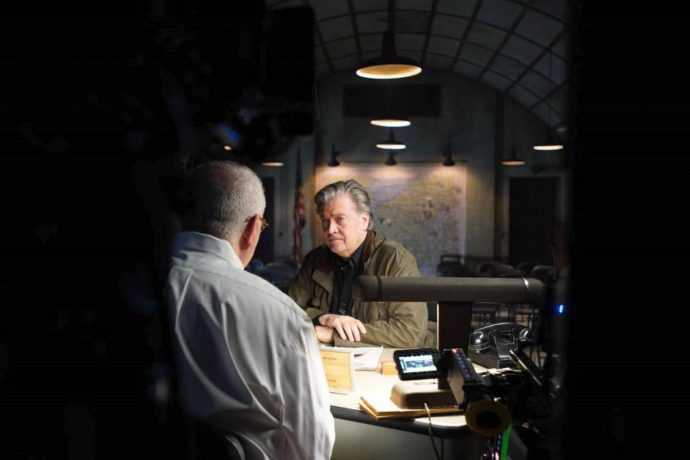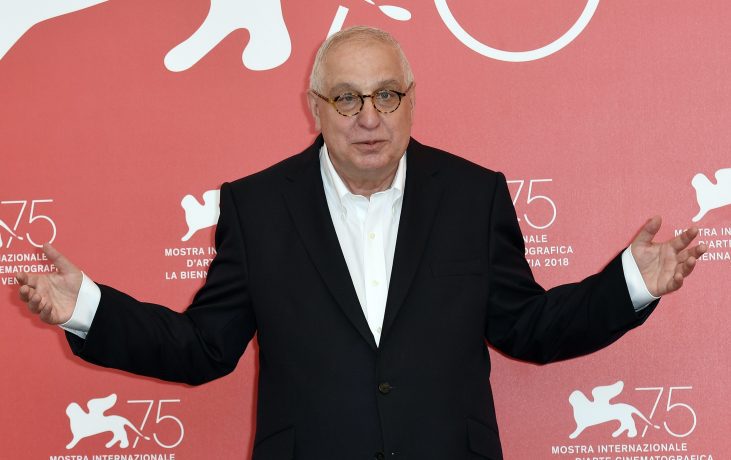Errol Morris: “The whole country has gone batshit crazy”
A conversation with Errol Morris about his documentary American Dharma, the nonexistent "bromance" with Steve Bannon, and what he really thinks about Trump.
“The whole country has gone batshit crazy –
And the reaction to American Dharma seems so much part of it.”
A conversation with Errol Morris.
Errol Morris’s latest documentary is a feature-length conversation with Steve Bannon, filmed on the recreated set of the 1949 movie Twelve O’Clock High, which is one of Bannon’s favorite movies. Throughout American Dharma, the interview is intercut with clips from Twelve O’Clock High, and other Bannon favorites, as well as coverage of the Trump campaign, political ads run by the campaign, and stories from the Breitbart website.
Steve Bannon is a highly polarizing figure. He is considered the mastermind behind the 2016 election of Donald Trump. He was Trump’s Chief Strategist during the first seven months of his administration. He is the former executive chairman of the far-right Breitbart News. He served on the board of Cambridge Analytica, the data-analytics firm involved in the Facebook scandal. In spite of the fact that Errol Morris has stated his objections to Bannon’s views both in the film (at one point he calls him mad), and in multiple interviews, he has still been accused of having a “bromance” with Bannon, of giving “a platform to a man charged with abetting the spread of hate.”
“I disapprove of what you say, but I will defend to the death your right to say it,” wrote Evelyn Beatrice Hall over 100 years ago. Many of the critics of American Dharma seem to believe the opposite. Much of the criticism of the film has revolved not around the film itself, but around the controversy surrounding its protagonist.
Donald Trump is President, and there is little doubt that Bannon played a major role in his election. Who he is, how and why he did it – these are crucial questions to ask about a person who has had an irrevocable and controversial impact on contemporary U.S. politics and culture.
The following has been edited for length and clarity.
I thought American Dharma is an incredibly interesting film and I really appreciated how it is very meta as a film, very self-referential.
Nice to hear.
I feel like that has not been what people have been talking about.
You would be right about that.
I worked on a film called The Final Year—
Of course.
And I noticed a similar response. I think people got lost in the politics.
Yes, but this has been unusual. And I don’t get it – when people say that this is a Bannon apology film. When the film was shown at the Venice Film Festival, one critic called it a ‘bromance’. I think it’s utterly nuts, to see this film in any way as a pro-Bannon film.
I thought the style of the film said a lot — fictional movies inside a documentary, a documentary filmed on the set of a fictional film; a documentary subject who is arguably a character of media creation; screens within screens. I don’t understand how those elements were missed.
Most people missed everything. I think the movie is hopelessly meta. I like that. A New Yorker interviewer came a couple of weeks ago and said “You know, I have to be completely honest with you…This is your least ironic movie.” My son said to me “Well, they really know how to irritate you, don’t they?” And it’s true. Irony, for me, is why I’m even still alive. No irony, I just couldn’t bear any of it.
I watched Twelve O’Clock High for the first time shortly before I started to interview Bannon. What a weird, fucked-up movie. And what a powerful movie. What’s the message? Maximum effort. You get in that airplane and you go over Nazi Germany and you drop those bombs and if you die in the process, that’s just fine. We are all together in an effort to destroy the enemy. Okay, I’m a Jew. Am I happy that Nazi Germany was defeated? Yes. But I asked myself, could this be a movie for the Third Reich? It’s nihilistic. There is no really inherent morality other than winning and more winning. And then Bannon tells me, “First week Harvard Business School. Maximize shareholder value, kill the enemy!”
I don’t wanna be so bold as to claim this is an irony, but let’s call it a possible irony: Bannon takes a World War II movie about defeating Nazi Germany as his model for the 2016 election. Maximum effort, win at all cost. You’re on the plane or you’re off the campaign. Anything goes. Bring in the Clinton accusers now. There he is in his Quonset hut from Twelve O’Clock High. My production designer, Adam Stockhausen, did a beautiful job of recreating that Quonset hut. It’s pretty stunning and we all enjoyed, stunning as it was, burning the sucker to the ground.
Did making American Dharma make you look at the 2016 election differently?
One of the things that I learned making this movie is that the 2016 election was about sex, but not the way people thought. Wasn’t about glass ceilings. Yes, there was a misogynistic element, but it went so much further than one could ever imagine. Not that Hillary was a perfect person or perfect candidate, but the insane hatred of Hillary. Plus this perfect storm – Wiener and his dick pics, Hillary and her emails. I put that commercial in American Dharma because, it’s the most powerful political commercial I’ve ever seen, where they link the dick pics with the emails, with pervert Anthony Weiner. It was an election about who’s the bigger pervert. When Hillary Clinton in the second debate calls Trump a puppet, he comes back and says, “I’m not a puppet, you’re a puppet. Puppet. Puppet!”. “I’m not a pervert. You’re a pervert! Pervert, Pervert!”.
I’ve never seen the world crazier. Maybe I missed the Third Reich – mercifully. But the whole country has gone batshit crazy. And the reaction to American Dharma seems so much part of it. A friend of mine wanted me to write a book, correctly pointing out that the movie might be interesting, but the reaction to the movie is maybe even more interesting.
I often think that [Trump’s] appeal, which of course mystifies me, is all those people who wanna say “fuck you” to their employers, to their spouses, to their children, to their communities, he’s given them permission.

What’s the most absurd question you’ve been asked about American Dharma?
Oh, that’s a competitive category. What did someone say to me this morning? “Why would you wanna make a movie about the Trump administration?” I’m not exactly sure of what you say. Maybe because, for example, I pick up the paper every morning and I read horror stories about what is going on in America.
What else?
I get out of the first screening at the Venice Film Festival, over a year ago now. The first review is from Variety, calling it a ‘bromance’. Attacking me, attacking the film, and then there were reviews that followed in a similar vein. David Remnick had disinvited, de-platformed Steve Bannon for the New Yorker Festival – I suppose telling people that it’s fine, it’s okay, see no evil, hear no evil. Let’s all stick our collective heads in a hole in the ground and pretend it isn’t there or pretend if we don’t look at it, it will go away.
Yeah. So, when people say to me, “How are you?” I always say, “Can complain.” And I like to point out that complaining is a skill that needs to be practiced constantly. So yes. I still complain, but it is better than it was a year ago. I couldn’t get a distributor. The movie was described to me as – this is the favorite word of the day – toxic! As if I were trying to poison people.
What is this film ultimately about?
My favorite theme is self-deception. Here’s another crazy thing someone said to me. “You portray him as a romantic hero.” And I said, “How’s that? Do tell.” And they said, “Well, he sees himself as a romantic hero.” And I say, “Indeed he does, but I would say that the movie leaves room for you to see that this thinking may be delusional… He sees himself as a populist.” I tell him, “It’s not populism, it’s anti-populism. You take money from the rich, from right-wing billionaires, you go to Harvard Business School, you work for Goldman-Sachs, buy and sell Hollywood companies. Fuck you and your populism! It’s not populism. Oh, you think it’s paying lip service to populism because you’re gonna build a wall and protect American jobs? Fuck you, that’s not protecting anything! It’s just a thinly disguised form of racism.”
You can see how annoyed he is when I call Trump ‘The Fuck You President’. Fuck the constitution, our democracy, fuck everything. And everybody. I often think that his appeal, which of course mystifies me, is all those people who wanna say “fuck you” to their employers, to their spouses, to their children, to their communities, he’s given them permission. “Hey you, go fuck yourself!” And if the movie has any message, it’s that at the heart of all of this is something really, really negative and mean. I hesitate to call it apocalyptic ‘cause it gives it too much dignity… it’s crypto-pseudo apocalyptic. It just reeks of fakeness, the pop philosophy of history, the Four Turnings.
You’ve been criticized for giving Bannon a platform, what happened to “I disapprove of what you say, but I will defend to the death your right to say it”? Surely the more controversial the person, the more you would seek to understand what’s going on underneath.
My essay in Airmail about interviewing – Why Talk to a Pariah? – is worth looking at. It’s along these lines. I think it is really important to look at these things.
I read that the interviews took about 16 hours with Steve Bannon.
He came back for five days of interviews and then he came back again when I shot him on that boarded-up movie set and on the runway and when I burned down the Quonset hut.
And was he ever different in front of the camera versus when it wasn’t rolling? Do you believe that he is who he believes he is?
So, I call this the pie graph question because people want me to present them with what percentage is snake oil salesman, what percentage is true believer? Don’t know. Maybe a mixture, a hopeless mixture of both. If I had to pick what is the predominant piece of the pie, snake oil salesman.
And he’s also totally fucking humorless. He comes in reading the book The Great Wall. Ooooh! Walls! That’s fantastic, you’re studying up on walls! Great!
That’s what you said to him?
Well, I said, “You know, the amazing thing is it worked, didn’t it?” And he said, “What do you mean?” I said, “No Mexicans in China”.
And what was his response?
He did not laugh.
I love the three D’s. It’s not reading, writing and arithmetic. It’s duty, dharma, destiny.

I was just wondering if there was ever a moment where you got a glimmer of a guy who had figured out the correct algorithm to sell this ideology.
Yeah. I think he’s always been working on it. He was working on it at Breitbart most certainly, in his contributions to Cambridge Analytica, in his work with Schweitzer, on the Clinton Foundation. He’s been rubbing his hands together, calculating for a while. I don’t know what triggered it. I should try to find out except I’m sick of it.
Something happened. I’ve been told – and this is anecdotal. Do I know this for a fact? I do not. But he’s a failed investment banker and he wanted to be an investment banker big shot and fell short – whatever that means. What made him, or was he always so unbelievably angry? I always saw him as some kind of right-wing version of Lenin, if Lenin himself wasn’t a right-wing version of himself.
Tell me about the three D’s.
I love the three D’s. It’s not reading, writing and arithmetic. It’s duty, dharma, destiny. Great! And they tell me that if you’re a bullshit artist, you can justify anything and everything. One size fits all. It’s like Sansabelt pants. Orson Welles in Chimes at Midnight rejected by Henry V. Not a tragedy, Falstaff isn’t sad, he’s happy. Why? Dharma fulfilled. They’re all happy. All those tragic figures. Lear’s delighted at the end of the play. Hamlet’s having a great time. Macbeth is delighted with it all. And Othello, happy that he had an opportunity to strangle Desdemona.
As we’re wrapping up, I wanted to ask you about Elizabeth Holmes. I think she is one of the most fascinating characters in recent history–
I would agree.
But I think she’s been vilified, made one-dimensional. I know there’s been a lot of controversy over the advertisements you did for Theranos.
Wait, wait, you don’t have to say, “I think she has been vilified.”
She has been.
There you go.
I read that you wanted to make a film about her… Why didn’t you make it?
Well, I’ve been criticized for doing her ads, although when I agreed to do these ads, she was on the top of the world, on the cover of every major magazine. And I liked her. As I love to tell people, I like weird girls. And she definitely was a weird girl. She was extremely bright, extremely strange, charismatic, and I feel that in the end, this attempt to describe what happened in Theranos falls short of the mark. Did she do bad things? You betcha. Was this a bogus company ultimately? Yes. They promised things that they couldn’t deliver and didn’t have.
What’s interesting to me is – what was going on here? What was she thinking? But, it was never gonna happen because her lawyers won’t allow her to talk about it. She and the company are involved in constant, unremitting litigation.
I kept thinking about the story and I watched six Joan of Arc movies in a row – because Joan of Arc is a really problematic figure. Also a girl. Burned at the stake if memory serves me correctly.
We don’t really believe today that God was talking to her because we don’t, for the most part, believe in that kind of God, the patriarch who in some stentorian voice speaks to us mortals about our destiny in life.
And to me, Elizabeth Holmes is a kind of interesting crazy person who, from the time she was a little girl, saw herself as having this very strange destiny. So yes, I am interested in the story. Will I ever get to tell it? Probably not. And if I did, would I be vilified for telling it? Probably. But that clearly doesn’t really stop me.
Alice Kate Bristow
I am a filmmaker from London who specializes in feature-length documentaries. For the last four years, I have been working for UK-based Passion Pictures in Los Angeles under two-time Oscar-winning producer, John Battsek. My work has spanned music documentaries to films about US foreign policy.

